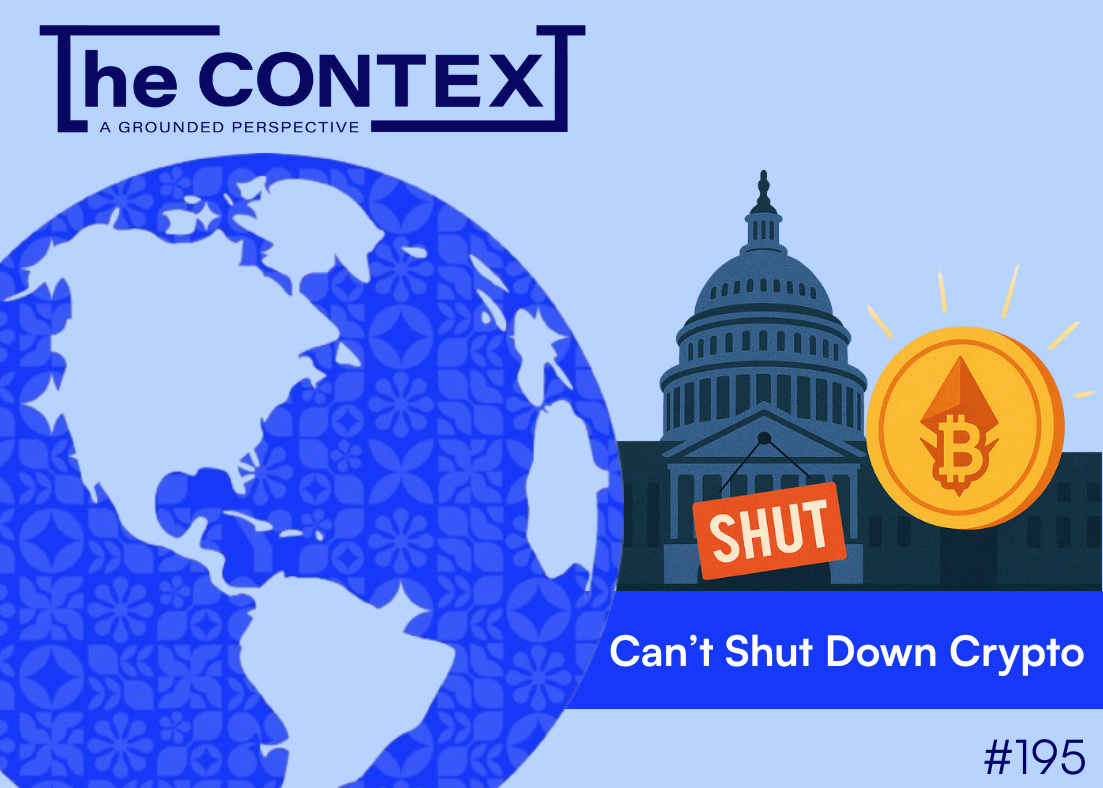Can’t Shut Down Crypto 🤯
Plus: Regulator remix
In this week’s edition of The Context, we discuss:
How the U.S. government shutdown could affect crypto
Why a prominent New York regulator is stepping down
What killed Brian Quintenz’s nomination to lead the CFTC
Who will get the $6.7 billion in Bitcoin Zhimin Qian stole
[Number Go Shutdown? 🐓]
The US federal government shut down—meaning “nonessential” government services ceased—after Congress could not agree on a spending bill. What’s that got to do with crypto? This:
What Media Said 🧑💻:
Decrypt: The Bureau of Labor Statistics was set to release a jobs report Friday, which Bitcoin traders use to gauge the likelihood of the Federal Reserve lowering interest rates.
CoinDesk: A shutdown means furloughing SEC staff, which could mean a delay in approving Solana and Litecoin exchange-traded funds. “In past shutdowns, regulatory reviews on financial products were often paused unless deemed critical to market stability.”
DLNews: Shutdowns can rattle markets at “a critical time for the crypto industry. Trump’s pro-crypto initiatives — including signing a smattering of executive orders, government appointments and at least one law — has propelled it to heights never seen before.” Plus, Congress is working on a new bill. The worry is that momentum will stall.
PR Perspective 🔎:
Shutdowns are an elaborate game of chicken. Who will constituents blame? What services will they miss? How will markets respond to uncertainty? With past shutdowns, crypto wasn’t really a factor. But as a maturing asset class, cryptocurrencies and the companies built around them can no longer sit back and watch the show; they’re part of the news cycle.
[Regulators…Dismount 👀]
Adrienne Harris, head of New York’s Department of Financial Services (NYDFS), is stepping down after a four-year tenure marked by aggressive crypto regulation and major enforcement actions, including a $2.2 billion settlement with cryptocurrency exchange Gemini.
What Media Said 🧑💻:
Politico: “Harris, a former White House staffer under President Barack Obama, is well-known in Washington, particularly given the key role that New York has taken in regulating crypto businesses.”
The Block: NYDFS is a financial watchdog for a state that houses Wall Street and created BitLicenses — the nation’s first crypto licensing regime — in 2015. Under her leadership, it released guidance to companies launching cryptocurrencies and stablecoins.
Fortune: “Harris’s willingness to wade into the thorny sector when many other financial supervisors relied solely on lawsuits won her the begrudging respect of many blockchain entrepreneurs, though they still grumbled about the laborious process of applying for BitLicenses.” In fact, New York became a model for the Genius Act’s stablecoin regulations.
PR Perspective 🔎:
New York Governor Kathy Hochul named Kaitlin Asrow acting superintendent. But all eyes will be on Harris’s permanent replacement, as President Trump pushes for the arrest of NY Attorney General Letitia James, who collaborated with the NYDFS on crypto enforcement actions. Recent NYDFS actions may put the new superintendent on a collision course with the administration.
[Quintenz and CFTC Not to Be 🤔]
The White House pulled Brian Quintenz’s nomination to become chair of the Commodity Futures Trading Commission (CFTC).
What Media Said 🧑💻:
WSJ: The former CFTC commissioner and head of policy at a16z crypto was nominated in February with broad crypto support — but not from pro-Trump Winklevoss twins, who head crypto exchange Gemini. Quintenz contends “the brothers began working against his nomination after he declined to help them” sink a Biden-era CFTC investigation and lawsuit.
Cointelegraph: This is important because the CFTC is going to have a much bigger role in crypto regulation if/when the Digital Asset Market Clarity Act gets passed.
Crypto in America: The White House says it will name a new candidate soon. “The current talent pool includes SEC Crypto Task Force Chief Counsel Mike Selig, Milbank LLP partner Josh Sterling, Treasury crypto adviser Tyler Williams, and former CFTC Commissioner Jill Sommers.”
PR Perspective 🔎:
The Trump administration has largely stood by nominees that have proven controversial. So it’s a bit surprising that this nomination stalled; Quintenz is a former commissioner with experience in crypto, prediction markets, and other emerging commodities.
[The UK’s Bitcoin Dilemma💰]
Zhimin Qian pleaded guilty to possessing and transferring criminal property in a London court. Qian allegedly defrauded over 128,000 Chinese investors between 2014 and 2017, then converted the proceeds to bitcoin and fled to the UK on a fake passport. With the help of an accomplice, she tried laundering the money by buying luxury properties.
What Media Said 🧑💻:
Reuters: How much has BTC gone up since when she bought it? Well, “British police seized wallets holding more than 61,000 bitcoin, currently worth 5.1 billion pounds ($6.7b) – making it one of the largest cryptocurrency seizures by law enforcement worldwide.”
BBC: That’s more than enough to pay back her victims. But “some reports have suggested the UK government will seek to retain the seized funds.” Legal reforms from the previous government ”make it easier for the UK authorities to seize, freeze and recover crypto assets.”
Bitcoin Magazine: Why no fraud charge? “The trial highlights the challenges of prosecuting cross-border cryptocurrency crimes…The lack of a UK-China extradition treaty and the fact that no UK entities were directly involved complicate potential fraud charges.”
PR Perspective 🔎:
The government now has billions in seized bitcoin and must decide whether to keep it or return it to the Chinese victims who were scammed. If the UK keeps the money, it risks looking like it’s profiting from someone else’s fraud, which could damage its reputation. Why not split the difference? Compensate the victims (with interest) to show the UK takes financial crime seriously and treats victims fairly. Then figure out what to do with the rest.
[3 Hard-to-Ignore Headlines 📢]
Justin Sun owns more TRX than everyone else combined, report
by Protos
Tron founder Justin Sun is a huge proponent of World Liberty Financial, the Trump-backed decentralized finance project. This report suggests his decentralized currency is overly centralized.
Memecoins Are Coming to the Stock Market
by Joel Khalili (Wired)
Dogecoin has a huge market cap but isn’t known for its utility. Should retail investors be allowed to access it through an ETF?
Robinhood Explores Launching Prediction Markets Outside US
by Emily Nicolle (Bloomberg)
Polymarket has controlled global prediction markets but been shut out of the US. Robinhood could be starting a turf war.
[Tweet of The Week]
Credit: @0xEthanDG
Connect with YAP Global: Website, X & LinkedIn
The usual disclaimer: This newsletter collates the main themes and headlines of the week in DeFi/crypto/metaverse/Web3/NFT land and tries to provide unbiased context. It’s aimed at anyone who wants to keep an eye on the space. It’s put together by a team at YAP and doesn’t contain any promotion of our clients (if one is mentioned, we’ll flag that).
The team: Founder Samantha Yap and consulting editor Jeff Benson, Andrew Wickerson, Nathalie Larrea, Meghna Dembla, Samvidha Sharma, William Knight, Taylor Handler, Abby Notarnicola, Zeke Harker, TJ Thomas and Shajar Qureshi. Your feedback is, as always, welcome. Ping us at thecontext@yapglobal.com. Old newsletters can be found here.
This newsletter is prepared by YAP Global, an international PR Consultancy focusing on helping cryptocurrency, Decentralised Finance (DeFi) and brands through impactful storytelling. Find out more about us here.





The Justin Sun ownership concentration piece is wild. Owning more TRX than everyone else combined doesn't just make TRON centralized, it makes it essentially a unilateral dictatorship with blockchain characteristics. The whole decentralization narrative falls apart when one person can single-handedly move the market or control governance decisions. It's basically what Ethereum would look like if Vitalik held 51% of all ETH.
I think the Quintenz situation you covered is more important than people realize. The fact that the Winklevoss twins could torpedo his nomination because he wouldn't help them kill a regulatory investigation says a lot about how crypto influence works in this administration. If a16z's policy chief with actual CFTC experience can't get confirmed becuase he wouldn't play ball on enforcement, what does that mean for the independence of whoever does get the job?
The UK Bitcoin seizure is fascinating from a legal precedent standpoint. You're right that keeping the funds risks making the UK look like it's profiting from fraud, but there's also a practical problem with returning them to Chinese victims. How do you verify legitimate victims versus fraudsters claiming losses? And if the UK can't prosecute for fraud due to jurisdictional issues, does that mean the criminal proceeds just... evaporate into some legal gray zone? Your split the difference approach makes sense, but I bet the Treasury is just going to keep it and call it a forfiture asset.
The Dogecoin ETF possibility is genuinely hilarious. Retail investors getting access to a joke coin through a regulated investment vehicle is peak 2025. But honestly, if it has a market cap and liquidity, why shouldn't people be allowed to trade it? The idea that the SEC needs to protect people from their own bad investment decisions is paternalistic and inconsistent with how they treat other speculative assets. If someone wants to YOLO their retirement into meme coins, that's on them.